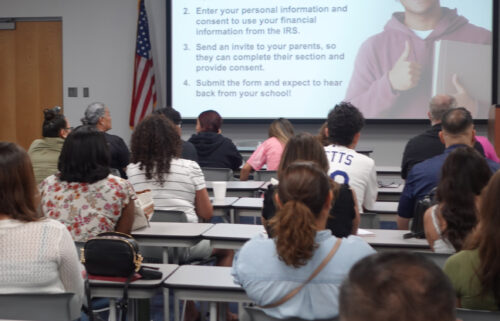Millions of people have long Covid, including children and pregnant people, studies show
Originally Published: 12 FEB 24 17:55 ET
Updated: 12 FEB 24 18:18 ET
By Jen Christensen, CNN
(CNN) — Millions of people deal with Covid-19 symptoms long after their initial infections. Two new studies – one looking at pregnant people and the other on children – give a better look at the burden from this health problem that doctors say often goes under the radar.
The first study says that 1 in 10 people who had Covid when they were pregnant will develop long-term symptoms. The results were shared Monday at the Society for Maternal-Fetal Medicine’s annual meeting in National Harbor, Maryland.
The researchers used data from the National Institutes of Health’s Recover Initiative, a project created to determine the long-term effects of Covid in adults and children. Of the 1,503 people who were pregnant in the dataset, 9.3% reported having symptoms six months or more after they were infected. The most common symptom was a feeling of being tired after light physical or mental activity. Some also reported dizziness.
The percentage of pregnant people with long Covid is on the low side compared with the proportion of the general US population, some research says. Estimates of adults who develop long Covid range from 2.5% to 25%, although different studies have different definitions of how “long” Covid is defined. This study doesn’t get at why the numbers may be different, but co-author Dr. Torri Metz, an associate professor of obstetrics and gynecology and vice chair of research of obstetrics and gynecology at University of Utah Health, has a few ideas.
“That could be because they have less baseline medical complications, overall. They are younger. It could also be that they have a different immune response,” Metz said.
A pregnant person’s immune system is generally more tolerant of “things that shouldn’t be there,” she said, so the mother’s body can host and nurture a fetus with different genetics.
Often, people who are pregnant tend to get sicker when exposed to a virus because their immune system doesn’t have the some robust response it typically would. This could mean the pregnant body develops less inflammation, the immune system’s natural response to an infection. Other studies have linked prolonged inflammation after Covid to impacts to the brain and to damage to the lungs and kidneys.
“So maybe they don’t have as much of the surrounding organ damage and the downstream complex consequences,” Metz said.
Pregnant people who developed long Covid also shared some common factors. Those who had obesity, who had a diagnosis of chronic anxiety or depression or who required supplemental oxygen when they were sick had a higher risk of long Covid.
It didn’t seem to matter what trimester someone got sick with Covid, and vaccination status wasn’t a statistically significant factor. More than half of those with long Covid had been fully vaccinated. But many studies have found that vaccination lowers the risk of severe disease, which can make long Covid more likely.
Metz said the research did find that socioeconomic factors affected long Covid numbers.
“It’s concerning that we had a very high proportion of patients who reported that they were having difficulties paying their bills,” she said. “That raises red flags about what sort of access are people getting to the care that they need.”
The study paints a clearer picture about who might be more likely to get long Covid, says Dr. Amy Edwards, associate medical director of pediatric infection control at UH Rainbow Babies & Children’s Hospital, who manages the hospital’s long Covid clinic.
“Chronic stress is well known to mess up your immune system. Stress tends to stimulate a particularly maladaptive inflammatory response, and there’s a well-known association with chronic stress,” said Edwards, who was not involved with the new research.
It will be helpful for doctors to know that if someone who had Covid during pregnancy is still fatigued eight weeks after birth, it could be long Covid rather than the usual fatigue that comes with a newborn, she said.
An important next step – and one that is already in progress, researchers say – is to look at the outcomes of the infants of pregnant people who developed long Covid.
The other new research, published last week in the journal Pediatrics, looked at a variety of studies on children and found that up to 6 million have developed long Covid.
Most young people who had long Covid recovered eventually, the studies suggest, but a third had symptoms even a year after their initial infection.
Long Covid symptoms in children included breathing problems like a cough, shortness of breath and chest tightness, along with fatigue.
Edwards said it’s important not to minimize the impact of long Covid on kids just because the symptoms often resolve.
“Imagine, as a teenager, missing two years of formative experience due to long Covid. I don’t even want to think about what the long-term impacts of that are,” she said.
The research also showed that children had a higher risk of some autoimmune conditions like type 1 diabetes after Covid infection, even if the illness had been mild or asymptomatic. One US study the authors reviewed found a 72% increased risk of developing diabetes within six months of an initial infection.
Studies haven’t fully explained what factors kids with long Covid have in common. Those who have housing and food insecurity and who have disrupted access to health care in general have “an exacerbation of illness via decreased immunologic functioning,” the new research said.
Edwards said she and some other doctors who run pediatric long Covid clinics across the country have recently noticed that the full-on rush of patients they saw earlier in the pandemic has been slowing down, “which is fantastic.”
But there are still so many young people with long Covid that fewer patients just means a shorter waiting list, she said: Instead of an eight-month wait to get into her clinic, patients are now waiting about five months.
The-CNN-Wire
™ & © 2024 Cable News Network, Inc., a Warner Bros. Discovery Company. All rights reserved.




